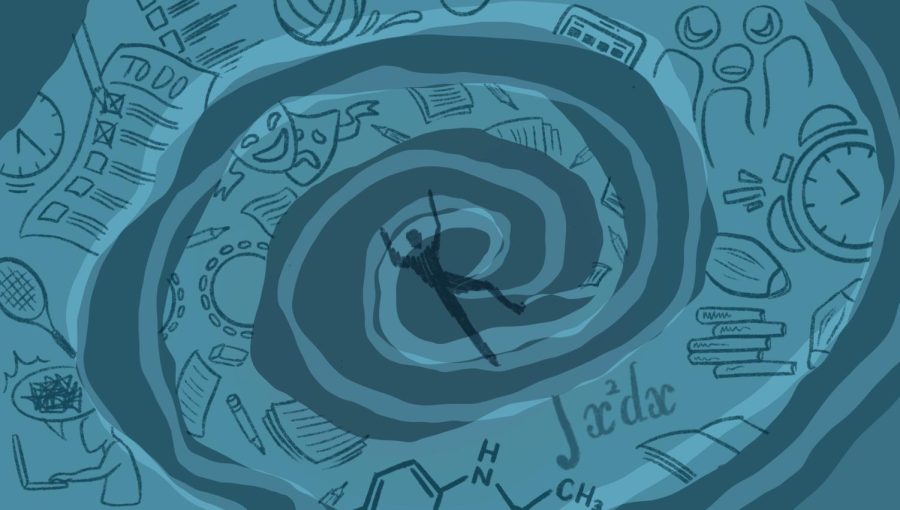Editorial: Changing our meaning of ‘normal’
Systemic reform needed to effectively address community struggles
As we come back, we’re questioning what we used to consider “normal.” Sometimes, it all feels like too much.
We’ve been back for 11 weeks on our upper school campus at Saratoga, finally back to lunches with friends, back to commuting in the morning, back to after-school sports practices and games, performing arts productions and spirit traditions.
Before the pandemic began, we were fine with going through a school day like this. So why doesn’t our “Harker normal” feel better? Why do we feel so tired forty minutes into first period? Why do we need breaks in every class so much now?
As we come back, we’re questioning what we used to consider “normal.” Sometimes, it all feels like too much.
After a missed year and a half spent off campus, coming back in person has meant fulfilling — but draining — face-to-face social interactions. And returning to the rigors of in-person school caught us off guard.
We’re also still grappling with the uncertainty of a pandemic as COVID-19 continues to claim over 1000 lives daily in the U.S, with a collective death toll of 750,000 lives lost.
In a survey conducted by Harker Journalism, we received 182 responses, consisting of 169 students, 12 faculty and one staff member. Here are some statistics that stood out:
Only 6.7% replied that they slept at least eight hours on average.
57.7% of the responses stated that they feel more tired compared to last year.
28.4% skip lunch at least once a week.
More than 50% of students averaged at least four assessments or projects per week, over the past month.
It’s clear that we need systemic adjustments now to address the ongoing wellness struggles our student body and faculty currently face.
Consistent breaks in all classes — with no additional work assigned during this time — give us a chance to hydrate, take a breath, use the restroom and interact with peers. Breaks also give our teachers a little time to breathe, as well. Out of 161 students, 60.9% felt that at least five-minute breaks were necessary.
We also support the “office hours days” instituted by the administration during remote learning last year, as do 93.6% of 171 students.
Those days provided a well-needed respite which students utilized to meet with their teachers, catch up on sleep, spend time outdoors or plunge into their mountain of assignments. When supplemented with assemblies about larger issues such as diversity and health, these break days also provided opportunities for us to learn about issues concerning our community and possible improvements.
Winged Post would also like to commend the Harker Spirit Leadership Team (HSLT) and Student Activities Board (SAB), who have worked toward creating a positive atmosphere this fall in which we can thrive through lighthearted spirit activities. We loved interacting with others during the expanded fun of two weeks of Homecoming, and we love Fantastic Fridays and Winterfest festivities.
But, we need more.
Even with these changes, we might still feel overwhelmed. Some of us suffer in silence, fearing the implications of appearing weak to others. But we’re not alone. The Harker community provides mental health resources — our counselors and advisers are here to support us through our hardships.
Our faculty and staff also deserve patience and respect. Our administrators and teachers put on a brave front, reassuring us with their stability, but they experience many of the same adversities we do.
To help our teachers, we can plan and assess our needs ahead of time, such as by asking for extensions on assignments or rescheduled assessments ahead of time, using designated office hours to ask for academic help and avoiding emailing faculty over weekends.
There are also other, more tangible ways to help our campus. Our kitchen staff is short-handed, as is our facilities crew. We can pitch in to dispose of trash and clean eating areas.
In following through with these tangible actions, we can create a healthier environment for our community as the year progresses.

Emily Tan (12) is the co-editor-in-chief of The Winged Post. This is her fourth year on staff, previously serving as the Winged Post features editor, and...


















![“[Building nerf blasters] became this outlet of creativity for me that hasn't been matched by anything else. The process [of] making a build complete to your desire is such a painstakingly difficult process, but I've had to learn from [the skills needed from] soldering to proper painting. There's so many different options for everything, if you think about it, it exists. The best part is [that] if it doesn't exist, you can build it yourself," Ishaan Parate said.](https://harkeraquila.com/wp-content/uploads/2022/08/DSC_8149-900x604.jpg)




![“When I came into high school, I was ready to be a follower. But DECA was a game changer for me. It helped me overcome my fear of public speaking, and it's played such a major role in who I've become today. To be able to successfully lead a chapter of 150 students, an officer team and be one of the upperclassmen I once really admired is something I'm [really] proud of,” Anvitha Tummala ('21) said.](https://harkeraquila.com/wp-content/uploads/2021/07/Screen-Shot-2021-07-25-at-9.50.05-AM-900x594.png)







![“I think getting up in the morning and having a sense of purpose [is exciting]. I think without a certain amount of drive, life is kind of obsolete and mundane, and I think having that every single day is what makes each day unique and kind of makes life exciting,” Neymika Jain (12) said.](https://harkeraquila.com/wp-content/uploads/2017/06/Screen-Shot-2017-06-03-at-4.54.16-PM.png)








![“My slogan is ‘slow feet, don’t eat, and I’m hungry.’ You need to run fast to get where you are–you aren't going to get those championships if you aren't fast,” Angel Cervantes (12) said. “I want to do well in school on my tests and in track and win championships for my team. I live by that, [and] I can do that anywhere: in the classroom or on the field.”](https://harkeraquila.com/wp-content/uploads/2018/06/DSC5146-900x601.jpg)
![“[Volleyball has] taught me how to fall correctly, and another thing it taught is that you don’t have to be the best at something to be good at it. If you just hit the ball in a smart way, then it still scores points and you’re good at it. You could be a background player and still make a much bigger impact on the team than you would think,” Anya Gert (’20) said.](https://harkeraquila.com/wp-content/uploads/2020/06/AnnaGert_JinTuan_HoHPhotoEdited-600x900.jpeg)

![“I'm not nearly there yet, but [my confidence has] definitely been getting better since I was pretty shy and timid coming into Harker my freshman year. I know that there's a lot of people that are really confident in what they do, and I really admire them. Everyone's so driven and that has really pushed me to kind of try to find my own place in high school and be more confident,” Alyssa Huang (’20) said.](https://harkeraquila.com/wp-content/uploads/2020/06/AlyssaHuang_EmilyChen_HoHPhoto-900x749.jpeg)



